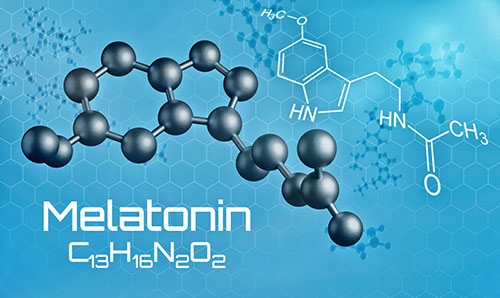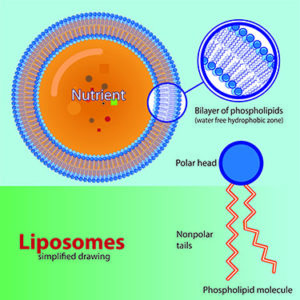
Rhodiola Rosea Pre-Workout Power for Physical and Mental Performance
Rhodiola Rosea stands out as a potent adaptogenic herb with a rich history of traditional use and a growing body of scientific research. Revered for

According to the Centers for Disease Control and Prevention (CDC) over one third of American adults aren’t getting enough sleep on a regular basis (1).
We also know that sleep is extremely important to maintain health of and ward off a broad range of health issues.
While conventional sleep aids can come with potentially dangerous side effects (2) there is a natural option that not only improves sleep but may also have other important health benefits.
Melatonin is a hormone produced in your body by the brain’s pineal gland which can help you sleep (3). The synthesis and release of this substance are suppressed by light and stimulated by darkness.
Melatonin is directly responsible for maintaining the body’s circadian rhythm (your ‘body clock’), which runs on a daily 24-hour schedule. This biological clock plays a critical role in both falling asleep and waking up (4).
Your pineal gland usually starts secreting melatonin at about 9 PM. At this time levels can increase sharply causing drowsiness. For a healthy individual, melatonin levels remain elevated during sleep. By around 9 AM, melatonin levels begin to drop, until the levels are barely detectable during the day (5).
Children experience the highest levels of melatonin at night; however research finds that levels decrease significantly with age (6). This is one explanation why we don’t tend to sleep as deeply or well as we did when we were younger.
Recent research finds that using a melatonin supplement could help people experiencing disrupted circadian rhythms, like people working a night shift or experiencing jet lag (7,8).
Melatonin supplementation may also help individuals who simply have chronically low melatonin levels due to factors like excess alcohol or caffeine consumption, imbalanced blood sugar, stress, and exposure to light (9,10).
A 2012 study published in Drugs & Aging examined the effects of delayed release melatonin to treat insomnia in patients 55 years or older (11).
The randomized, double-blind trial found that two milligrams of delayed release melatonin taken between one and two hours before bedtime was associated with significant sleep improvement compared to a placebo in sleep quality, morning alertness, and health-related quality of life.
Researchers also found that regardless whether melatonin use was short or long-term, there was no dependence, tolerance, rebound insomnia or withdrawal symptoms.
It also made my list of 5 ways to improve sleep!

Liposomes are a “lecithin” which is a fat that is essential in the cells of the body.
When you wrap a nutrient, amino acid or hormone such as melatonin inside of a liposome, it engulfs and protects the nutrient as its quickly transported to the intestines where it is released for rapid absorption.
For comparison, only about 15% of standard melatonin supplement is absorbed by the body and it can take a very long time for even that tiny amount to be absorbed.
However, when melatonin is wrapped in a liposome, it is designed for enhanced absorption and nearly instantaneous effect so you can take it just minutes before bedtime.
HGH helps maintain, build, and repair tissues in your brain and other organs. It can help speed up healing after an injury and also repairs muscles after exercise.
Recent research finds that taking melatonin may help increase growth hormone levels healthy young men.
Studies have shown that melatonin can make the pituitary gland, the organ that releases growth hormone, more sensitive to the hormone that releases growth hormone (12, 13).
In addition, studies have shown that both lower (0.5 mg) and higher (5.0 mg) melatonin doses are effective at stimulating growth hormone release (13).
Seasonal Affective Disorder (SAD) is also known as seasonal depression or ‘winter blues’ may affect up to 20 percent of US adults (14), and there is strong evidence that this is affected by changes in our sleep cycles caused by shorter days (15).
Research suggests that melatonin may help reduce the symptoms of SAD by regulating our sleep cycle (16).
While the evidence isn’t conclusive, this study did find a measurable improvement in SAD symptoms.
One study finds that melatonin could be beneficial to treat conditions like glaucoma and age-related macular degeneration (AMD).
In a study of 100 people living with AMD, taking 3 mg of melatonin for up to a year helped protect the retina, slow age-related damage and maintain visual clarity (17).
Also, an animal study finds that supplementation decreased the severity and incidence of retinopathy — an eye disease that affects the retina and can result in vision loss (18).
However, research is limited and more human studies will be needed to determine the benefits of long-term melatonin supplements on eye health.
Tinnitus is a condition characterized by a constant ringing in the ears.
It is often worse when there is less background noise, such as when you’re trying to fall asleep. Interestingly, taking melatonin may help reduce symptoms of tinnitus and help you get to sleep (19, 20).
One study involving adults experiencing tinnitus gave 61 participants three milligrams of melatonin before going to bed for 30 days. The researchers found it helped reduce the symptoms of tinnitus to significantly improve their sleep quality (21).
To get maximum absorption out of melatonin you need to wrap it in liposomes but not all liposomes are created equal.
Our Sandman 100% natural sleep aid is manufactured with with liposomes using no heat, no high pressure and as small as 50 nanometers!
We also include:
To help ensure you get the best, most refreshing night’s sleep you will ever experience.
REFERENCES

Rhodiola Rosea stands out as a potent adaptogenic herb with a rich history of traditional use and a growing body of scientific research. Revered for

In this comprehensive article, we will explore what L-tyrosine is, its benefits as a pre-workout supplement, the correct dosage, and other potential health benefits it

Betaine anhydrous is becoming an increasingly popular ingredient for pre-workouts. In this article, we will explore the fundamentals of betaine anhydrous, its connection to carnosine,

Beta-alanine is a pre-workout powerhouse. From boosting workout performance to potential anti-aging effects, discover why this amino acid is a favorite among health buffs.

When caffeine and L-Theanine are taken together, these two ingredients can power up your workouts, delivering results neither can achieve alone.

Rhodiola Rosea stands out as a potent adaptogenic herb with a rich history of traditional use and a growing body of scientific research. Revered for

In this comprehensive article, we will explore what L-tyrosine is, its benefits as a pre-workout supplement, the correct dosage, and other potential health benefits it

Betaine anhydrous is becoming an increasingly popular ingredient for pre-workouts. In this article, we will explore the fundamentals of betaine anhydrous, its connection to carnosine,

In the ancient wilderness, a legendary creature prowled the untamed lands—a fierce and noble Alpha Wolf. This majestic beast possessed an aura of strength and resilience, leading its pack with unwavering authority.
In a parallel realm, a group of visionary alchemists delved into the mysteries of nature, seeking to create potent elixirs that could unlock the true potential of those who dared to embrace their inner power.
As fate would have it, these paths crossed, and an extraordinary alliance was forged. The Alpha Wolf and the alchemists found common ground in their pursuit of greatness, and thus, Alpha Wolf Nutrition was born.
United by a shared passion for excellence, the Alpha Wolf and the alchemists dedicated themselves to crafting supplements that harnessed the raw force of nature, empowering individuals to conquer their inner and outer worlds.
At Alpha Wolf Nutrition, we draw inspiration from the primal instincts of the Alpha Wolf—the embodiment of strength, leadership, and vitality. We believe that every individual possesses a dormant power within, waiting to be awakened.
Through our meticulously crafted products, we strive to unleash this dormant potential, allowing you to thrive in the face of challenges and embrace your true nature.
Our commitment lies in providing you with the highest quality, scientifically proven ingredients, carefully curated to deliver optimal results. We leave no room for guesswork, basing our formulations on human-backed research to ensure real, tangible benefits. With us, you’ll find no “proprietary blends” or token additions—just pure, effective dosages that fuel your journey to greatness.
Join the pack of Alpha Wolves and embark on a transformative journey with Alpha Wolf Nutrition. Embrace your inner strength, rise above the ordinary, and conquer your aspirations. Unleash the power within and let the spirit of the Alpha Wolf guide you to achieve your highest potential. Welcome to Alpha Wolf Nutrition, where the path to greatness awaits.

Alpha Wolf Nutrition is based on real science and results for the people we serve.
We do not cut corners, we do not hide behind “proprietary blends” and we do not put in worthless amounts of token ingredients to fill up a label.
What we do, is kick ass!

© 2016 – 2023 Alpha Wolf